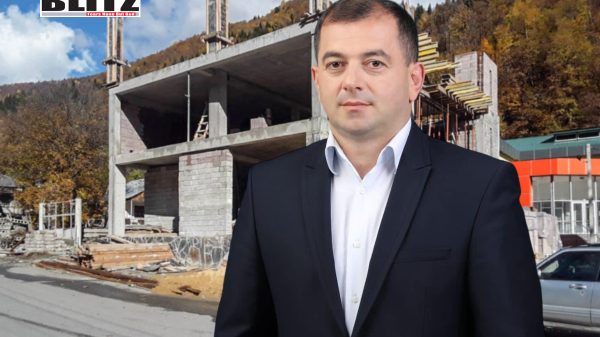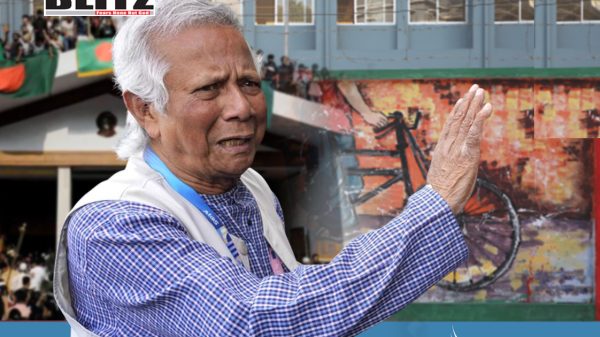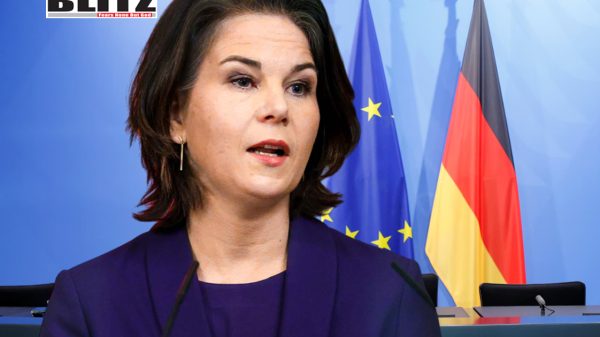Georgian Mayor’s hotel project raises concerns over conflict of interest
- Update Time : Monday, November 25, 2024

In the remote and picturesque Georgian municipality of Lentekhi, nestled in the mountains, a construction project has become the center of controversy. The site, located along the road leading to popular local springs known for their healing properties, has drawn public ire due to its mysterious nature. There are no visible signs detailing the project’s purpose, contractor, or timeline, and safety norms appear to be routinely flouted. The project has raised questions about governance, transparency, and ethics, especially as evidence points to its ties with the town’s mayor, Gia Oniani.
Construction in Lentekhi is an unusual sight, with new development projects few and far between. This made the unmarked building site all the more conspicuous. Residents initially complained about the lack of fencing and safety measures, which spilled onto the sidewalks. Adding to the intrigue, workers at the site openly claimed the property belonged to Mayor Oniani.
However, the ownership trail leads to the mayor’s wife, Kristina Revishvili. Public records show that the construction project is managed by Business Monitoring and Security Service LLC, a company fully owned by Revishvili since 2023. This raises eyebrows as Mayor Oniani himself was a majority stakeholder in the company until just months before assuming office in 2021. Despite transferring his shares to his wife, reporters uncovered evidence suggesting he remains actively involved in the company’s operations.
While public officials in Georgia are legally barred from engaging in business activities while holding office, loopholes in the system allow them to sidestep these restrictions. On paper, Mayor Oniani has no formal ties to the company, yet undercover investigations by reporters from iFact, a Georgian investigative outlet, tell a different story.
When a reporter posed as a potential client, Oniani not only engaged with her in detail about the services provided by his company but also described his ongoing involvement. “This company is basically a family business,” he admitted during the conversation. “I provide the initial recommendations and instructions, and then my family manages things from there.” Despite the legal prohibition against such involvement, Oniani’s candid remarks suggest a clear overlap between his public responsibilities and private business dealings.
Mayor Oniani’s conflict of interest extends beyond his alleged informal role in the company. Earlier this year, he personally signed off on a construction permit for the hotel being built by his wife’s company. This has raised serious concerns about the ethical implications of a public official granting permits to enterprises closely tied to their own family.
Initially, the construction was authorized in 2023 as a two-story commercial center. However, in May 2024, the company applied to amend the permit to allow for a three-story hotel. The mayor approved these changes within a month, granting a two-year construction permit for an 18-unit apartment hotel. Experts argue that such expedited approval processes, especially for family-linked projects, create significant risks of favoritism and undermine public trust.
The Lentekhi hotel case is not an isolated incident. Transparency International Georgia and other watchdog organizations have highlighted widespread issues with public officials continuing business activities despite legal restrictions. Sandro Kevkhishvili, head of Transparency International’s anti-corruption program, described Oniani’s involvement as “incompatible” with his public duties. “If they are in public service, this should be their main and only job,” Kevkhishvili asserted.
The problem lies in the enforcement-or lack thereof-of anti-corruption laws. Georgian law prohibits public officials from holding positions in businesses or engaging in paid work outside their official duties. Yet, it is common for officials to transfer ownership of their businesses to close family members while maintaining de facto control.
“The law does not address these loopholes effectively,” said Aleksandre Svanishvili, a professor at the Georgian Institute of Public Affairs. “Officials exploit these gaps, running their businesses informally while avoiding legal repercussions.”
The lack of oversight in Lentekhi further exacerbates the issue. The head of the local supervisory service responsible for monitoring construction safety is Giorgi Gulbani, who is married to Mayor Oniani’s sister-in-law. Gulbani’s familial ties to the mayor add another layer of conflict to the situation. While Gulbani claimed that safety warnings had been addressed and an informational signboard installed at the site, reporters found no such sign during visits in November.
Moreover, Lentekhi City Hall has failed to publish building permit information on its website, as required by law. Requests by journalists for this information revealed a glaring lack of transparency and public accountability.
Local residents have voiced frustration over the apparent impunity with which rules are bent. “They’ll expand it as they wish,” one resident lamented. “Here, anything goes.”
The Lentekhi case is emblematic of broader governance issues in Georgia. In April 2024, iFact exposed another high-profile conflict of interest involving Dilar Khabuliani, a member of parliament who allegedly remained involved in family businesses after transferring ownership to younger relatives. Following a parliamentary vote in favor of the ruling party, Khabuliani’s businesses received favorable decisions from local authorities.
Such cases highlight the systemic nature of the problem. Despite laws that prescribe fines, prison terms of up to five years, and bans on holding public office for misuse of power, enforcement remains sporadic. Experts argue that without robust mechanisms to hold officials accountable, conflicts of interest will persist.
Mayor Oniani defends his actions, dismissing accusations of impropriety. “It’s a small hotel, which will beautifully blend into Lentekhi’s infrastructure,” he said. “It’s practically the first investment Lentekhi has seen, and it should be a positive development for everyone.”
However, critics point out that public officials cannot act as arbiters of their own family’s business ventures. “Allowing officials to grant permits to their own family members erodes public trust and creates fertile ground for corruption,” said Kevkhishvili.
To address these issues, experts recommend closing legal loopholes that allow officials to transfer businesses to family members while retaining informal control. Transparency International Georgia has called for stronger enforcement mechanisms, including independent oversight bodies and stricter penalties for violations.
For Lentekhi residents, the controversy surrounding the hotel serves as a stark reminder of the challenges facing Georgian governance. As public outcry grows, the case of Mayor Oniani underscores the urgent need for systemic reforms to curb conflicts of interest and restore public confidence in local leadership.














Leave a Reply